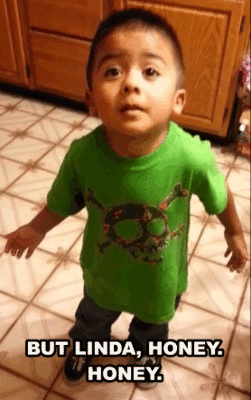
WHY DON’T MY GIFS WORK?!
Listen Linda,
Let me just say, this has been a tremendously informative class. I have learned things I didn’t know were out there to learn (if that makes sense). One of the things that struck me as the greatest shift in mindset I made throughout this semester was the idea that people aren’t becoming more illiterate. We have simply developed new and, at times, more concise ways of saying things. This was a key issue in Bronwyn Williams’s writing as well as John Szwed’s piece, and I think this is the first time I started to have a perspective shift. “Little Johnny” is doing just fine even though every generation seems to have a literacy crisis according to the preceding generations. Literacy doesn’t mean knowing the difference between using the Oxford comma or not, it’s generally just a form of written expression. Szwed described how literacy goes beyond the academic setting, and I think that was really powerful. We tend to think about literacy as something strictly confined to essays and academic texts or novels. Szwed countered that we experience literacy in an abundance of other things in our daily lives from reading a sign to passing a note in class. Literacy cannot be restricted to the academic environment. This is something that the Hip Hop article group highlighted in their presentation; hip hop and poetry are distinctly related. That’s something I had maybe considered once or twice, but never really took an in depth look at how closely related they are. I’m so glad that the hip hop group asked us to examine it since they really expanded my perspective.
Are you listening, Linda?!
I really liked the idea of sponsorship in literacy. I didn’t so much enjoy the implications of sponsorship as much as the lens it provided through which to view literacy. Sponsorship developed the questions of “who gets sponsored” and “how.” Privilege has been a theme we have been playing with throughout the semester, and it’s something that Maggie has really brought to the forefront and helped me to think about in new and different ways. I had never really thought about how lucky I was that I had parents who encouraged reading and writing, as well as that I was exposed to computers and Microsoft Word from a young age. Not everyone gets these opportunities, and yet we are held to the same standards of the highest common denominator rather than the lowest. Sponsor programs like Common Core try to equalize student abilities, but result instead in restricted and cookie cutter curriculums (which is driving my mom, a fourth grade teacher, absolutely insane).
But Linda, honey, honey.
I think one of the most eye-opening things I’ve learned is the incredible benefits of low risk learning, and how that relates to gaming theory. I have never played video games, so I never saw their use until this class. The principles they are founded on are excellent models for the classroom, displayed not only by the gaming group, but by Kim’s entire class layout. I had wondered why it was that this class never seemed to be stressing me out while I was still learning twice as much information than in my other classes. It finally dawned on me (it was a slow dawn) after listening to the gaming group’s presentation that Kim’s class was so easy to be in because of the complete sense of security and pure learning environment that she had created. If I ever get into the teaching field (which isn’t really on my horizon), I hope I can develop an atmosphere like the one in this class.

 Website:
Website: